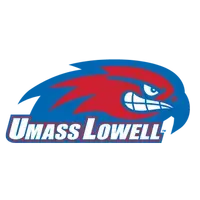University of Massachusets Athletics
The Last Minute (March 2002)
The Last Minute (March 2002)
 Bill Strickland |
The state budget cuts have found their way to the University, and not surprisingly, UMass has taken a big whack. In a state as smug as this one about its higher education, how astonishing is it to most people to find that we are now 50th-50th!-out of fifty in the rankings of state support for public higher education? There have been layoffs, program cuts-including athletics-and warnings of much more to come. The University is looking at a $17 million shortfall, the state a staggering $2 billion. Cuts in the courts threaten to bring the state's entire judicial system to a halt, or at best, slow it down to a snail's pace. We are in the midst of a serious, serious economic crisis. How you might ask, with that as a backdrop, could I possibly have the nerve to ask for more support for the UMass athletic program? My reason is simple. This athletic program is the University's best chance at taking steps towards the academic greatness and overall greatness it seeks to achieve.
In the last month the Faculty Senate passed resolutions calling for athletic cuts. It got what it asked for, although I am sure they would have been much happier if we had wiped out the football program, one of our most visible programs that brings tens of thousands of people to this campus each fall. The Senate also welcomed our football program's new defensive coordinator to campus by condemning his hiring, a particularly classy gesture. In these tense times, the people at UMass have reacted by doing the worst possible thing-beginning the process of devouring each other. The athletic department has become a lightning rod for these attacks. The thinking on campus is that if other programs are being cut, athletics should be cut, too. What they might as well say is that we should all sink into mediocrity together.
You will always find some members of the academic community that are resentful of athletics. They look at the money that athletics "loses" in a much different way than they look at the money that the chemistry or english departments lose. The mindset is predictable. Since the primary mission of the institution is education and research, money spent on athletics is money that could be better spent. If academics could just have that money that is being wasted on athletics, think of how much better things would be? Think of the faculty positions that could be filled, the academic departments that could be strengthened, or in this case, at least saved from cuts.
It is a utopian view of the educational institution, a far cry from real world issues that a university faces. It does not recognize the institution's need for mass exposure, it does not address alumni involvement, it does not deal with legislative support. Our neighbors to the south at the University of Connecticut have been the recipients of a $1.1 billion injection from the state and are about to get another one for $1.3 billion. We have many people on this campus that worked here in the 1980s, a time when nobody thought that UConn was as good a school as UMass, a time when the average legislator in Connecticut couldn't give two hoots about what was happening in Storrs. What changed? Do you think those legislators just woke up one morning and said, "Hmmm, today would be a good day for me to start investing more of my constituents tax dollars in UConn?" Not likely. But here are some things that did happen. The university made a conscious decision to invest more in athletics. In 1986, UConn hired Jim Calhoun to coach its men's basketball program. A year earlier, it had hired Geno Auriemma to coach its women's basketball program. Three national championships, 29 NCAA appearances and two billion dollar campaigns later, the Connecticut State Legislature might as well rename itself the Husky Club. (There is also another significant event which I would be remiss in leaving out. In 1986 casino gambling was established and forever changed the state's revenue stream.)
UConn President Philip Austin has said at several public functions that you would be crazy to think that it was a coincidence that three weeks after the UConn women's basketball team won the 1995 national championship and the UConn men went to the Elite Eight, the state legislature voted to support the $1 billion funding for "UConn 2000."
In the mid-90s, UMass was starting to invoke the kind of passion that Calhoun and Auriemma have brought to UConn. Legislators were coming to campus in droves to see the basketball team. There was a record number of UMass Alumni clubs around the country. The value of television and media exposure for the school was estimated in the hundreds of millions of dollars. A school which once struggled for name recognition outside of New England was now moving merchandise in South Africa and an untold number of other countries throughout the world. A who's who of local, regional and national figures wanted to be associated with UMass. Trivia time: When was the last time senators Ted Kennedy and John Kerry were on this campus at the same time? Answer: the 1996 men's basketball banquet.
I don't doubt for a moment that what I am writing here will make some people's blood boil. While athletics certainly enjoys tremendous support from many corners of this campus, there are those whose egos will not willingly accept the idea that an institution of higher learning should rely on athletics to raise the tide. But I am not talking about a utopian educational system, I am talking about reality. Are our society's values warped because we as a people are more passionate about what happens in the Mullins Center than we are about the wonderful things being done on our campus in polymer science, HRTA, the Isenberg School, or any of our other renowned academic programs? I'm not here to argue that point. What I am saying is the reality is what it is. We can sit around bemoaning the fact or we can try and take advantage of it, as UConn has.
Hey, I'm an associate athletic director. I do not deny there is some self-interest here-but that doesn't mean I'm wrong. As a University in a state so dominated by private education, we need to do more to stir the passions of the people in power. We need to throw away the "we must all suffer together" mentality that has us sinking into an abyss of mediocrity. When we get through these painful budgetary times, we must make sure to strengthen what remains, particularly those areas that have produced excellence. The athletic program has already proven it can stir the passions of the people of this state. It has proven it can instill a pride in our alumni that moves them to participation and then to action. Who else on this campus can say that? Yes, we have fallen upon hard economic times. The problem on our campus is that whether the economic times are good or bad, the attitude remains the same. Whether it be the Final Four in '96 or the football championship in '98, as an institution we do not know how to capitalize on success. When things were going well, the University responded by investing virtually nothing new in the athletic program. There was very little in the way of capital improvement and operations have been levelfunded four of the last five years. Then when things got tough, the immediate reaction was to cut.
You could wipe this athletic program off the face of the earth and save the University and the Commonwealth $10 or $11 million. If you think such a cut would "save" the educational quality of this institution, keep in mind that's about $5 million less than the Governor wiped out with one stroke of her pen. Gutting this program with no commitment towards the future will ensure that UConn will be the premier public institution in New England. A strong athletic program is a proven way to make people care about UMass. If we don't find a way to make them care, this University will have no chance to compete. But as my boss has often said, some people don't like success, because success is harder to manage than mediocrity.
In the last month the Faculty Senate passed resolutions calling for athletic cuts. It got what it asked for, although I am sure they would have been much happier if we had wiped out the football program, one of our most visible programs that brings tens of thousands of people to this campus each fall. The Senate also welcomed our football program's new defensive coordinator to campus by condemning his hiring, a particularly classy gesture. In these tense times, the people at UMass have reacted by doing the worst possible thing-beginning the process of devouring each other. The athletic department has become a lightning rod for these attacks. The thinking on campus is that if other programs are being cut, athletics should be cut, too. What they might as well say is that we should all sink into mediocrity together.
You will always find some members of the academic community that are resentful of athletics. They look at the money that athletics "loses" in a much different way than they look at the money that the chemistry or english departments lose. The mindset is predictable. Since the primary mission of the institution is education and research, money spent on athletics is money that could be better spent. If academics could just have that money that is being wasted on athletics, think of how much better things would be? Think of the faculty positions that could be filled, the academic departments that could be strengthened, or in this case, at least saved from cuts.
It is a utopian view of the educational institution, a far cry from real world issues that a university faces. It does not recognize the institution's need for mass exposure, it does not address alumni involvement, it does not deal with legislative support. Our neighbors to the south at the University of Connecticut have been the recipients of a $1.1 billion injection from the state and are about to get another one for $1.3 billion. We have many people on this campus that worked here in the 1980s, a time when nobody thought that UConn was as good a school as UMass, a time when the average legislator in Connecticut couldn't give two hoots about what was happening in Storrs. What changed? Do you think those legislators just woke up one morning and said, "Hmmm, today would be a good day for me to start investing more of my constituents tax dollars in UConn?" Not likely. But here are some things that did happen. The university made a conscious decision to invest more in athletics. In 1986, UConn hired Jim Calhoun to coach its men's basketball program. A year earlier, it had hired Geno Auriemma to coach its women's basketball program. Three national championships, 29 NCAA appearances and two billion dollar campaigns later, the Connecticut State Legislature might as well rename itself the Husky Club. (There is also another significant event which I would be remiss in leaving out. In 1986 casino gambling was established and forever changed the state's revenue stream.)
UConn President Philip Austin has said at several public functions that you would be crazy to think that it was a coincidence that three weeks after the UConn women's basketball team won the 1995 national championship and the UConn men went to the Elite Eight, the state legislature voted to support the $1 billion funding for "UConn 2000."
In the mid-90s, UMass was starting to invoke the kind of passion that Calhoun and Auriemma have brought to UConn. Legislators were coming to campus in droves to see the basketball team. There was a record number of UMass Alumni clubs around the country. The value of television and media exposure for the school was estimated in the hundreds of millions of dollars. A school which once struggled for name recognition outside of New England was now moving merchandise in South Africa and an untold number of other countries throughout the world. A who's who of local, regional and national figures wanted to be associated with UMass. Trivia time: When was the last time senators Ted Kennedy and John Kerry were on this campus at the same time? Answer: the 1996 men's basketball banquet.
I don't doubt for a moment that what I am writing here will make some people's blood boil. While athletics certainly enjoys tremendous support from many corners of this campus, there are those whose egos will not willingly accept the idea that an institution of higher learning should rely on athletics to raise the tide. But I am not talking about a utopian educational system, I am talking about reality. Are our society's values warped because we as a people are more passionate about what happens in the Mullins Center than we are about the wonderful things being done on our campus in polymer science, HRTA, the Isenberg School, or any of our other renowned academic programs? I'm not here to argue that point. What I am saying is the reality is what it is. We can sit around bemoaning the fact or we can try and take advantage of it, as UConn has.
Hey, I'm an associate athletic director. I do not deny there is some self-interest here-but that doesn't mean I'm wrong. As a University in a state so dominated by private education, we need to do more to stir the passions of the people in power. We need to throw away the "we must all suffer together" mentality that has us sinking into an abyss of mediocrity. When we get through these painful budgetary times, we must make sure to strengthen what remains, particularly those areas that have produced excellence. The athletic program has already proven it can stir the passions of the people of this state. It has proven it can instill a pride in our alumni that moves them to participation and then to action. Who else on this campus can say that? Yes, we have fallen upon hard economic times. The problem on our campus is that whether the economic times are good or bad, the attitude remains the same. Whether it be the Final Four in '96 or the football championship in '98, as an institution we do not know how to capitalize on success. When things were going well, the University responded by investing virtually nothing new in the athletic program. There was very little in the way of capital improvement and operations have been levelfunded four of the last five years. Then when things got tough, the immediate reaction was to cut.
You could wipe this athletic program off the face of the earth and save the University and the Commonwealth $10 or $11 million. If you think such a cut would "save" the educational quality of this institution, keep in mind that's about $5 million less than the Governor wiped out with one stroke of her pen. Gutting this program with no commitment towards the future will ensure that UConn will be the premier public institution in New England. A strong athletic program is a proven way to make people care about UMass. If we don't find a way to make them care, this University will have no chance to compete. But as my boss has often said, some people don't like success, because success is harder to manage than mediocrity.






